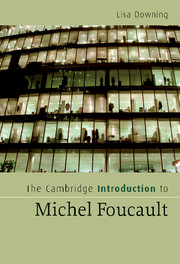Book contents
- Frontmatter
- Contents
- Preface
- List of abbreviations
- 1 Life, texts, contexts
- 2 Works: madness and medicine
- 3 Works: the death of man
- 4 Works: authors and texts
- 5 Works: crime and punishment
- 6 Works: The History of Sexuality
- 7 Critical receptions
- Afterword
- Notes
- Selected further reading
- Index
- The Cambridge Introductions to …
4 - Works: authors and texts
Published online by Cambridge University Press: 05 September 2012
- Frontmatter
- Contents
- Preface
- List of abbreviations
- 1 Life, texts, contexts
- 2 Works: madness and medicine
- 3 Works: the death of man
- 4 Works: authors and texts
- 5 Works: crime and punishment
- 6 Works: The History of Sexuality
- 7 Critical receptions
- Afterword
- Notes
- Selected further reading
- Index
- The Cambridge Introductions to …
Summary
We write to become other than what we are.
Michel FoucaultWhile most British and American university programmes in Literary Theory and Modern Critical Theory include works by Foucault on their bibliographies (most commonly the essay ‘What is an Author?’, 1969), his place in literary studies is not unproblematic. Neither Terry Eagleton's classic Literary Theory: An Introduction nor Jefferson and Robey's Modern Literary Theory: A Comparative Introduction – books produced during the mid-1980s, the hey day of the Anglo-American trend for critical theory – accord more than a passing mention to Foucault under the rubric of post-structuralism. This may be accounted for by the fact that it is simply not easy to ‘do’ a Foucaldian reading of a piece of literature or other cultural product in the way that one can ‘do’ a psychoanalytic, Marxist or phenomenological reading. This is because, rather than putting forward a theory of literature that one can ‘apply’ in a straightforward sense, Foucault's thought is concerned, first, with analysing the necessary conditions that allow literary values to be thought or discursively expressed at given moments, and, secondly, with observing the evacuation from literary language of individual authorial identity and systems of transparent meaning, in order to give access to ‘the lightning-flash’ (MC, p. 264) in which the otherwise silenced voices of madness or transgression can speak. It is literary writing for Foucault that renovates the way in which we think, and challenges assumptions about a subject of reason, a sovereign identity.
- Type
- Chapter
- Information
- The Cambridge Introduction to Michel Foucault , pp. 53 - 68Publisher: Cambridge University PressPrint publication year: 2008

